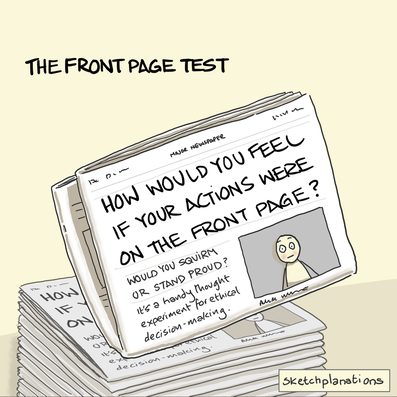
I do not want to see 'In Innovation we Trust', 'Customers are King' and 'Quality in Everything we do' emblazoned across the chest or neatly arranged in a small quadrant of the corporate polo shirt, sweater or hoodie
Taking a good look in the mirror
If senior managers want to change their organization, they ask people to change how they behave and act. It makes sense for those managers to lead by example. I ask managers, especially those comprising the SMT, to consider their behaviour and think about how they consciously behave. I ask them to be open and assess their strengths and limitations. Ostensibly, I want them to take a long critical view in a mirror and consider the consequences of their behaviour when they are their best self and when they slip. Their behaviour may be perceived as less than desirable.
What's it like to receive your behaviour on a bad day?
I do ask SMT members to think about what it is like to receive their behaviour. Not just on a good day when they are behaving impeccably but also on a bad day when things are not going right, when they may be time-pressured, grumpy, and not in their best moods.
The perceived 'You' and the real 'You'
Often, we are unconscious of how our behaviour is received and how others interpret it. We may be slightly annoyed by a decision that did not go our way and appear less than patient, overly argumentative, short-tempered, and frankly unpleasant.
Everybody is a boss watcher
If you are in a position of authority, people will watch and listen to you most of the time – even when you are unaware of it. Your actions and behaviour help form opinions and indicate how best others can deal with your known or favoured actions and behaviours. They learn how to respond to you to put themselves in the best psychological position possible.
Honest or dishonest responses
I know of many instances when staff have been requested to complete an honest 360-degree assessment of their bosses' behaviour. You would not be surprised how many complete the form with a politically astute and defensive, rather than an honest, response.
The front-page test
So, finally, I asked managers to assess the front-page test. That is, how you would feel if your actions were on the front page of a popular newspaper? Would it make you proud, or would you have a difficult moment? As the cartoon implies, would you squirm or be proud of things you said and did?
It is one of many tests that senior Leaders have to pay attention to when committing their organization to culture change. If handled well, it could model the way for behaviour change across the whole organization.
Some final questions
- How much is your view of your authentic self shared by other people?
- If you could hear what people were saying about you before you entered a room, would it make you feel good or not?
- What behaviours do you know are holding you back from being a more effective Leader, and what are you prepared to do to change them?
- What should you do more, and what should you do less?
- What behaviours do you believe your Leadership cohort or peers display which is not conducive to effective change?
- What can you do to kick off a meaningful drive for behaviour change to build a strong culture?
Email Philip
Thank you to Sketchplanations
 RSS Feed
RSS Feed

